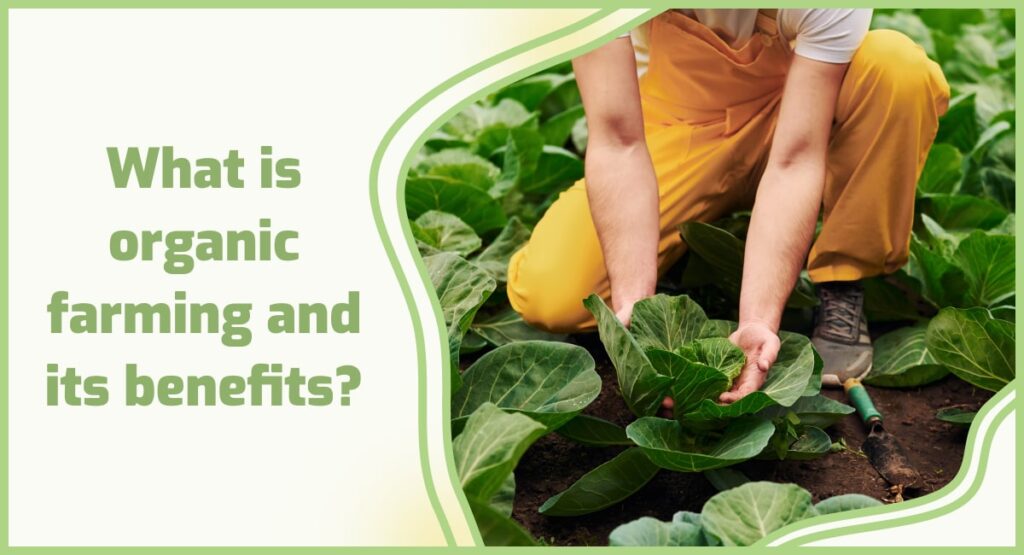
Organic farming offers a multitude of benefits that extend beyond just the absence of synthetic chemicals. It promotes healthier ecosystems by relying on natural processes and biodiversity to maintain soil fertility and combat pests. By avoiding synthetic pesticides and fertilizers, organic farming reduces chemical residues in food and water, which can have positive implications for human health. Moreover, organic practices often enhance soil structure and water retention, making farms more resilient to climate change and reducing the need for irrigation. Supporting organic farming also means supporting sustainable agricultural practices that prioritize environmental conservation and long-term food security.

Organic farming techniques are central to realizing the myriad benefits that organic agriculture offers. Unlike conventional farming, which relies heavily on synthetic chemicals and genetically modified organisms (GMOs), organic farming embraces natural methods to cultivate crops and raise livestock. These techniques not only promote environmental sustainability but also contribute to healthier food production and enhanced biodiversity.
One of the primary benefits of organic farming techniques lies in their ability to maintain and improve soil health naturally. Practices such as crop rotation, cover cropping, and composting are foundational to organic agriculture. Crop rotation involves planting different crops in sequential seasons to prevent soil depletion and break pest cycles, thereby reducing the need for chemical pesticides. Cover cropping with leguminous plants like clover or beans adds nitrogen back into the soil, enhancing fertility without synthetic fertilizers. Composting organic materials such as crop residues and animal manure enriches soil structure and promotes microbial activity, fostering a nutrient-rich environment conducive to robust plant growth.
In addition to soil health, organic farming techniques prioritize biological pest control methods over chemical interventions. Integrated Pest Management (IPM) strategies harness natural predators and beneficial insects to manage pests effectively. For instance, introducing ladybugs to prey on aphids or using pheromone traps to disrupt insect mating cycles are common organic approaches. These methods minimize pesticide use, preserve beneficial insect populations, and maintain ecological balance within farming ecosystems.
Water conservation is another significant advantage of organic farming techniques. By improving soil structure and organic matter content through practices like mulching and cover cropping, organic farms enhance water retention capacity. This reduces runoff and improves soil infiltration, ensuring crops have access to water during dry periods and mitigating the impacts of drought. Additionally, organic farmers often employ efficient irrigation systems like drip irrigation and rainwater harvesting to minimize water usage and promote sustainable water management practices on the farm.
Organic farming also benefits human health by producing food free from synthetic chemicals and GMOs. Studies have shown that organic produce typically contains lower pesticide residues than conventionally grown counterparts, which can accumulate in the body over time and potentially pose health risks. Choosing organic food reduces exposure to these chemicals, offering consumers a safer and more nutritious option for themselves and their families. Furthermore, organic farming supports animal welfare by emphasizing natural living conditions and prohibiting the routine use of antibiotics and growth hormones in livestock production.
From an environmental standpoint, organic farming techniques play a crucial role in mitigating climate change and preserving biodiversity. By avoiding synthetic fertilizers and pesticides, organic farms minimize greenhouse gas emissions and reduce their carbon footprint. Organic practices also promote biodiversity by creating habitats that support diverse wildlife and beneficial insects. Hedgerows, buffer zones, and native plantings provide food and shelter for pollinators and natural predators, contributing to ecosystem resilience and agricultural sustainability.
Economically, organic farming techniques can offer financial benefits to farmers through market premiums and reduced input costs over time. While transitioning to organic farming may initially involve higher labor costs and yield variability, organic certification often allows farmers to access niche markets willing to pay premiums for organic products. Over the long term, improved soil health and reduced dependency on external inputs can enhance farm profitability and resilience to market fluctuations.
Supporting organic farming techniques aligns with broader goals of sustainable development and global food security. By promoting practices that prioritize soil health, biodiversity conservation, and environmental stewardship, organic agriculture contributes to resilient food systems capable of adapting to climate change and ensuring long-term food security for future generations.
In conclusion, organic farming techniques encompass a holistic approach to agriculture that prioritizes sustainability, environmental health, and human well-being. By embracing natural processes and minimizing reliance on synthetic inputs, organic farmers create resilient ecosystems that support healthy crops, diverse wildlife, and vibrant communities. Investing in organic farming techniques is not just about producing food—it’s about cultivating a sustainable future where agriculture nourishes people and the planet alike.









